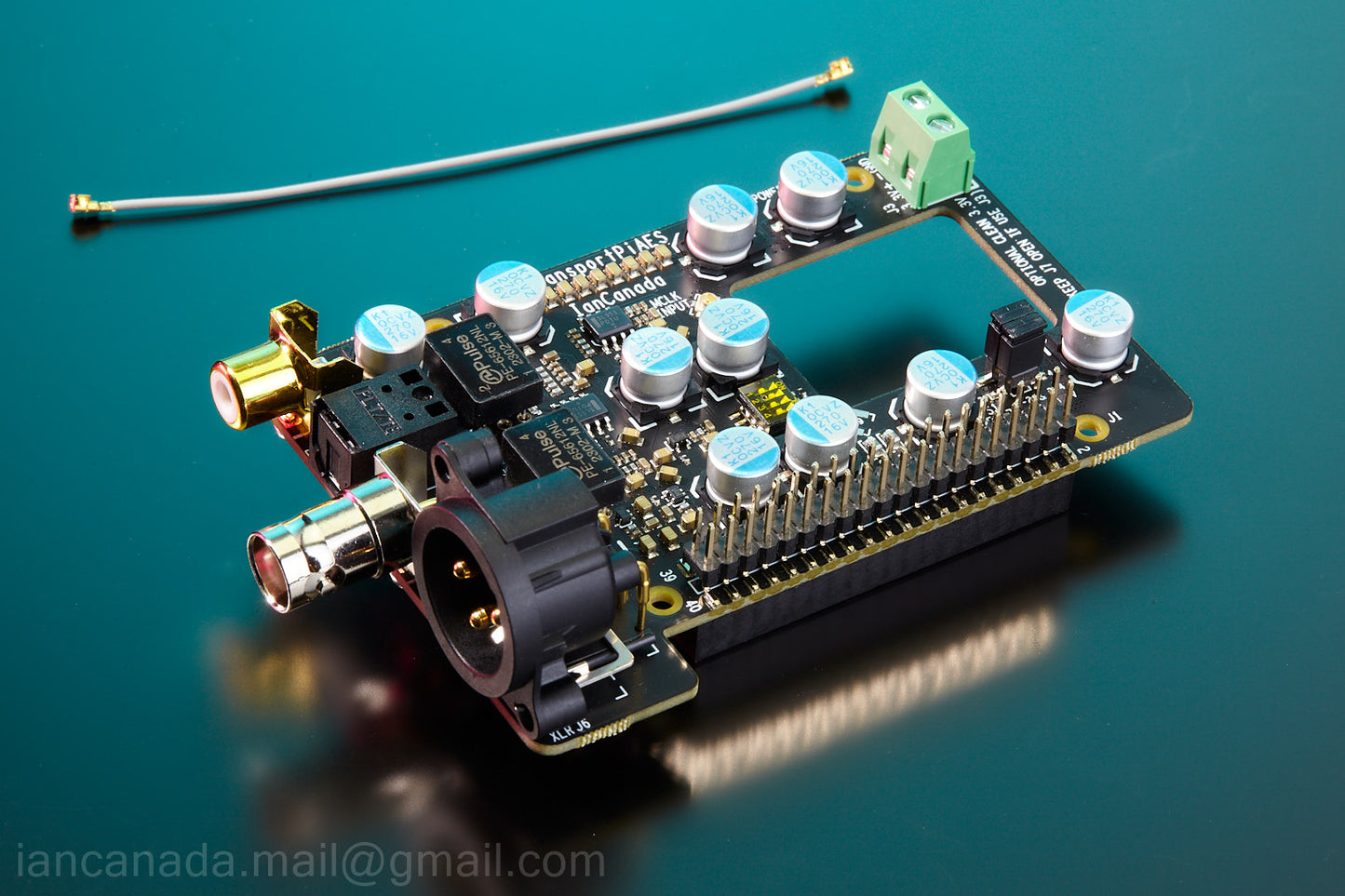IanCanada
#20C. TransportPi AES, Flagship AES/SPDIF stransport
#20C. TransportPi AES, Flagship AES/SPDIF stransport
5.0 / 5.0
(6) 6 total reviews
Couldn't load pickup availability
Introduction
TransportPi AES is a dedicated AES/EBU S/PDIF transport interface board. Compared with all other solutions, it is the first one that uses discrete 50Mbps 1-bit differential driver and dedicated femtosecond clock drivers to achieve the highest signal quality and lowest noise levels for both AES/EBU and S/PDIF outputs. And it also integrates the well-reputed multi-stages 1-bit discrete secondary re-clockers (similar to a ReClockPi) to ensure the best possible low-jitter performance. TransportPi AES is so far the flagship AES/EBU and S/PDIF transport interface board for audiophiles to improve the sound quality of an external DAC to a highest possible level.
TransportPi AES works in SYNC clock mode so it will need a FifoPiMa, FifoPiQ7 or Q3 to operate.
Highlighted Features and Specifications
- Flagship AES/EBU S/PDIF transport board with isolated AES/EBU, RCA, Toslink optical outputs and non-isolated BNC output
- Discrete 50Mbps 1-bit differential drive to achieve the best possible AES/EBU signal quality at the lowest noise levels
- Dedicated femtosecond clock drivers for S/PDIF outputs to achieve best possible signal quality and lowest jitter level
- Built-in the well-reputed 1-bit 3 stages discrete secondary re-clockers
- Enhanced high bandwidth power supply filtering networks
- LDO free design to make it directly use the 3.3V ultracapacitor or battery power supply for the best power supply performance
- Could be so far the best AES/EBU and S/PDIF streamer transport interface
- Optimized PCB impedance control for the high speed AES/EBU and S/PDIF signals
- 4 layers PCB design with dedicate shield layers to eliminate EMI noise
- Metal film ultra-low noise resistors to ensure the lowest possible noise level
- Pure sync mode works with FifoPiQ7, FifoPiMa or FifoPiQ3 or other re-clockers.
- Capable of AES/EBU and S/PDIF up to 192KHz. 384KHz is also possible for qualified receiver
- Upgradable and swapable AES/EBU, S/PDIF transformers
- Supports MCLK frequencies from 5.6448MHz to 98.304MHz
- Supports I2S and DoP format as input
https://github.com/iancanada/DocumentDownload/tree/master/TransportPi/TransportPiAES
Share

Used to make a killer Streaming Transport. Sound is excellent with my Schiit Gungnir.
Really enjoying listening via the aes output. Nice & easy to install & good service as ever. Thanks
Absolutely amazing.
Seams to be a good connection to the dac i am using. I go back to bnc native audio with little or smooth filters and its the sound i like. Several years back tryed pink Faun card in a computer that was built fast and the i2s just doesn't do it for me. I so tried the Ian Canada i2s board and same thing. I think i am just a coax and bnc rg59 with as little processing as posable guy. I am glad I ordered it. I will say over all the streamer is a large improvement to the i9 cpu monster from back then and that is with basic power supply and filtering. I am looking forward to some clock changes and would like bust open a LKS Audio 004 as i think there would be large improvement there as well.
I am using an Eversolo DMP-A6 with linear P/S upgrade to stream to my Geshelli Labs J3 DAC with Sparkos SS3602 opamps. The Eversolo USB output is actually quite good but the coax SPIDF input sounds better on the J3 than the USB input. In fact, I removed the Amanero USB card and got even better sound from the J3 SPIDF input.
But I felt the J3 still had more to give and the clocks in the Eversolo are surely mid-grade at best on its SPIDF RCA output. So I built a DDC from IanCanada's RecieverPi, FifiPi Q7II with stock FemtoMck clocks and his TransportPi with a UcPure and Ultra Capaciter pack for the 3.3V. I feed the DDC from the Eversolo USB output and send the DDC SPIDF output to the J3 through a quality RCA cable.
The improvement was immediate. Sound stage widened slightly but the layering down the bowling alley depth is astonishing. Imaging tightened up and the already detailed AKM 4499 DAC chip reveals even more subtleties. Everything sounds so 3D and alive. Very happy with this setup.
Of course, the DIY dream never ends and I'm now dreaming of Ian's top-end SC-Pure clocks to take this to the next level. And then there's Geshelli Labs Dayzee to consider...
